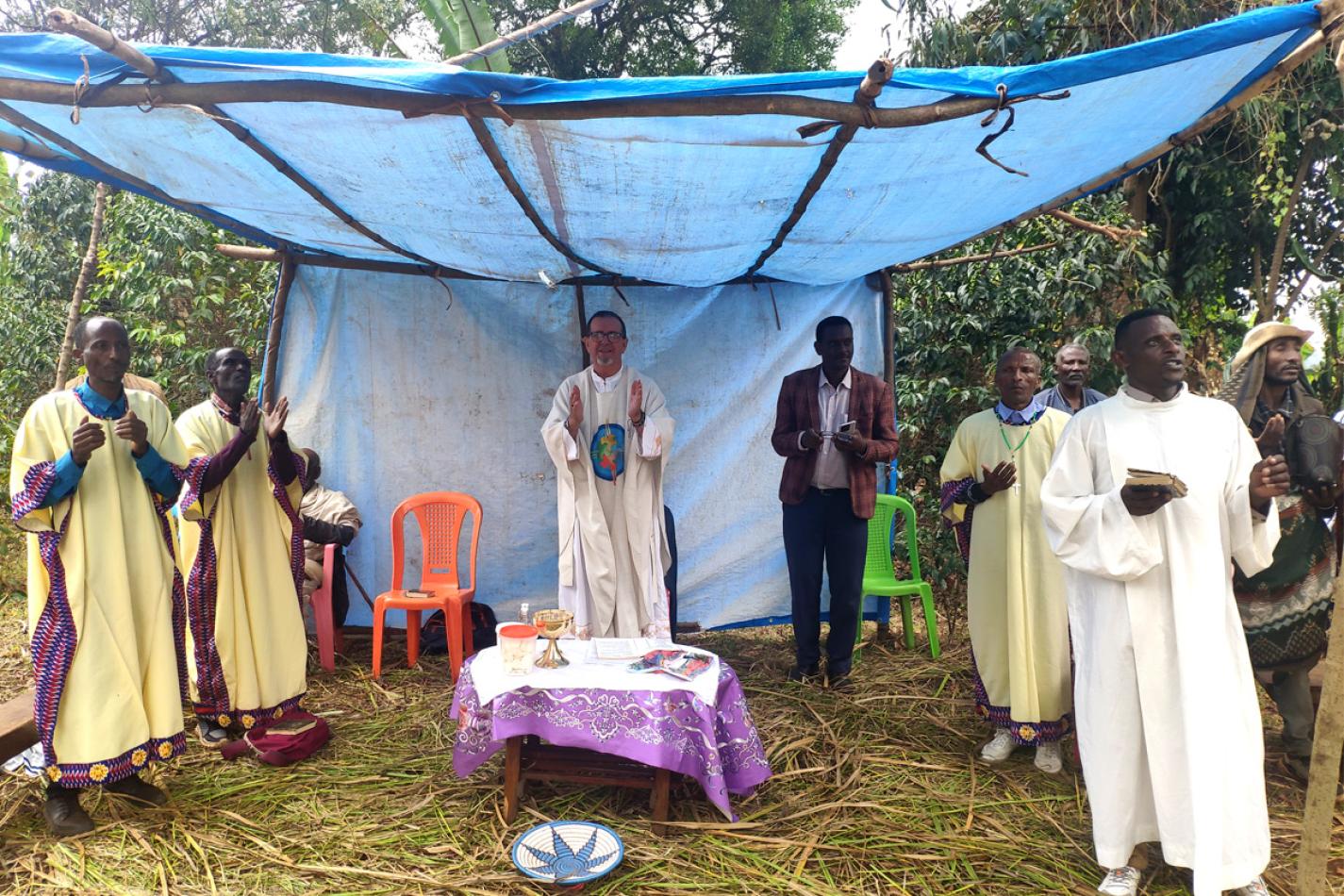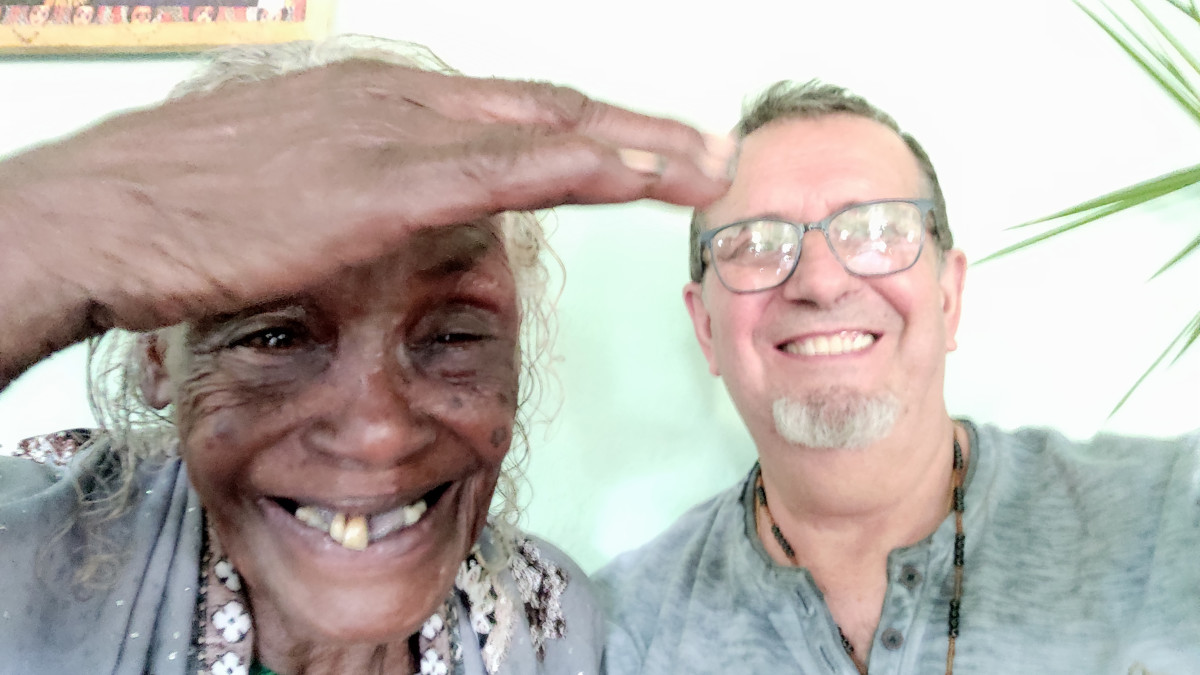Daniel Comboni
Comboni Missionaries
Institutional area
Other links
Newsletter
Thursday, October 30, 2025
Missionary service is both a task and a great gift from God—indeed, a cascade of gifts! The Lord of the Mission, who calls and sends, also blesses. Someone once asked me what mission has given me during my 44 years as a Comboni missionary. It was a simple question, yet it prompted me to make memory of the many blessings I have received by accepting to be a missionary disciple of Jesus in the way of St. Daniel Comboni.
A very extended family. Jesus promised that whoever leaves family and roots for His sake, will receive a hundredfold here—and eternal life afterward. He is a gentleman and keeps His word! I left Cinfães, my family and friends to follow Jesus as a Comboni missionary. I studied theology in England (four years) and served in Ethiopia (twelve years) and South Sudan (seven more). I also spent nine months in Mexico for ongoing formation. Today, I have an incredibly wide family spread across Europe, Africa, and the Americas—people I consider my parents, siblings, and friends. Social media helps me stay connected with all those I carry in my heart as gifts from Jesus.
A new people. Mission gave me a new people with whom I share a spousal relationship, embracing both their light and shadows. On January 16, 1993, I arrived at the Qillenso mission among the Guji people of southern Ethiopia, brought by the late Fr. Ivo do Vale. Until that day, I had never heard of the Guji, part of the larger Oromo family. Since then, I learned their language, cultural expressions, cuisine, and traditions. I even acquired some traditional Guji men’s clothing. This is the sacred ground where I tread barefoot, stripped of my own ethnocentrism. Learning proverbs and stories opened me to a new wisdom that complements the values that once shaped my worldview.
New ways of saying God. We Portuguese have our own ways of naming God, praying, and believing—varying from north to south. The Guji people also have a traditional way of invoking the Almighty. In their customary prayers, they call God “our father and our mother, our grandfather and our grandmother, our great-grandfather, the one who gave us birth.” This formula encodes not only a biblical truth but one echoed by many peoples: we come from God. As St. Paul proclaimed at the Areopagus in Athens, “In Him we live and move and have our being.” It’s fascinating to hear that “silence traverses God” and that “dry love (love without deeds) cripples”! In South Sudan, people often said “Allah karim”—“God is generous” in Arabic—another invocation I added to my litany of God’s names. Mission is also prayer. Jesus introduced people to a new relationship with God by calling Him “Abba”, “Daddy”. The missionary prays with the people and in their own way, facilitating and initiating their experience of God in the school of Jesus.
A new experience of time. Time—along with space—seems to us an absolute concept. Yet in Ethiopia, I discovered nothing is more relative than our lived experience of time. Ethiopians use a different calendar: as of September 11, we entered the year 2018—the first day of Meskerem, the opening month of the Ethiopian year, which has 13 months: 12 of 30 days each, plus Pagume, a short month of five or six days in leap years. Midnight is not at 12 a.m. but at 6 a.m. Christmas is celebrated on January 7, Epiphany on January 19, and Easter only occasionally coincides with the universal calendar—as it was in 2025. The Assumption falls on August 22, and the Feast of the Holy Cross on September 27. I also learned that time is not measured by the clock but made through interpersonal encounters, and that natural daylight—not wristwatches—determines the hours of the day. A wristwatch? Merely an expensive bracelet! On cloudy days, time itself feels different.
The mysticism of everyday life. In Ethiopia, daily life unfolds calmly. Learning this rhythm meant slowing down. For my first eight years, missionary work was done mostly on foot. Today, asphalt has reached the mission territory, and where it has not, the trails are wide enough for vehicles. Living slowly, walking through the forest, I regained awareness of my surroundings: birds and their joyful songs, sunbeams playing with morning mist through ancient trees, wild orchids, tiny flowers dotting the green earth… I rediscovered the mysticism of ordinary life—and even began writing poetry again.
A unique professional experience. In Portugal, I served primarily through journalism, working for twelve years with the Comboni magazines Além-Mar and Audácia. Later, the General Council of the Comboni Institute invited me to join a team of two Comboni sisters and one brother to establish the Catholic Radio Network in South Sudan, serving as Director of Information. Despite scarce technical resources, nighttime gunfire, and scorching heat, it was a unique professional experience. I began at Radio Bakhita in Juba. When seven additional FM stations in South Sudan, one in the Nuba Mountains (Sudan), and a Salesian station became operational, I set up my own newsroom with two other journalists. It was a demanding period—training media professionals and reporting on the diary of a nation being born, occasionally clashing with authorities—but also deeply rewarding.
What mission gives the Church…
Another question: What does mission give to the Church? The answer includes countless gifts.
Identity. Mission restores the Church’s own identity. The Church is mission. Jesus did not fund her as an esoteric club for the redeemed. He sent her to the ends of the earth and to the margins of life to proclaim the Good News of the Kingdom of Justice, Peace, and Joy already present among us. A Church without mission is not the Church.
Sharing. Cardinal Luis Antonio Tagle, head of the Dicastery for Evangelization—the Vatican’s missionary department—was once bishop of the Filipino Diocese of Imus. Despite having very few priests, he chose to share some with mission territories. His advisors disagreed, but they went anyway—and the diocese was blessed with an abundance of vocations. Mission reveals God’s mathematics: in order to multiply, you must divide. Sharing is the path to revitalizing and renewing older Churches.
Energy. The universal Church is the communion of all particular or local Churches. Young Churches energize older, more weary ones—they send sisters and priests to serve in various ministries. It is estimated that around 400 foreign priests currently serve the Church in Portugal amid our severe vocational drought. The joy with which young Churches celebrate liturgy and life inspires older Churches to balance liturgical norms with the Holy Spirit’s creativity, which moves and stirs communities. They remind us that living faith is not merely intellectual (ideas) or emotional (intimacy), but embodied—expressed through word, music, dance, and silence. Older communities have grown frail and need the celebratory energy of young communities, who teach us that every moment—life and death, joy and sorrow—is worthy of celebration. To celebrate together in an act of genuine and heartfelt solidarity.
Hospitality. Hospitality is a commandment in the Global South, whereas suspicion often prevails in Northern communities. Proclaiming God as our common Father means welcoming everyone—strangers included—as brothers and sisters. Hospitality keeps communities open and attentive to the needs of the poorest and most vulnerable. And it is learned. During my walks through Guji territory in November and December—the season of abundant maize—if I passed a child eating a roasted or boiled corn cob while tending livestock, he would immediately break it in half and share it with me. I knew he would not eat again until nightfall, yet refusing his generous hospitality would have been deeply rude. Hospitality is both offered and accepted. It is an act of humility and humanity—a recognition that I am not self-sufficient, and that the other gives meaning to my identity.





